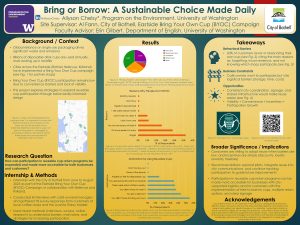Bring or Borrow: A Sustainable Choice Made Daily
Single-use cups are a major contributor to local waste streams, yet few effective reuse systems have been scaled across suburban areas. This project investigates how Eastside coffee shops and their customers perceive and participate in reusable cup programs, and what barriers limit adoption. While Seattle has piloted several reuse services, the Eastside – lacking commercial composting and dense reuse infrastructure – offers a distinct challenge and opportunity for system design.
Through an internship with the City of Bothell working on the Eastside Bring Your Own Cup (BYOC) Campaign, I interviewed café managers and owners and analyzed reuse service models across the region. The mixed-methods approach captured both quantitative patterns in customer motivations and qualitative insights from businesses navigating logistical and behavioral challenges. Survey findings show that awareness and incentives drive willingness to use reusables, while forgetfulness and limited visibility of programs remain primary barriers. Interviews highlighted enthusiasm among small business managers and owners but also revealed operational friction and low customer awareness.
The results suggest that successful reuse programs must balance convenience with clear communication and visible community support. Integrating local government, business managers and owners, and reuse providers such as Okapi Reusables into a shared infrastructure could make reusable systems more practical beyond urban centers. This project demonstrates how localized collaboration and behavior-informed design can help bridge the gap between sustainability ideals and everyday coffee consumption habits, contributing to broader circular economy goals.
